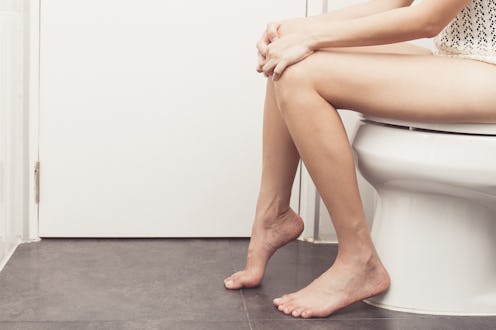Life
6 Signs You Have An Overactive Bladder And Didn’t Realize It
If you're someone who always has to go to the bathroom or find that some urine slips out when you least expect it, there might be something going on with your bladder. There are a number of signs of an overactive bladder that you may not realize, and since most people don't go around discussing their bathroom habits, you might not even be aware that something is off in your body. Not all signs of an overactive bladder are super obvious, but just know that if you are experiencing any of these symptoms, a trip to the doctor could help.
"About 33 million people suffer from overactive bladder, a condition where the bladder spasms and contracts without permission from your brain," urologist Jennifer Linehan, M.D. tells Bustle. "Usually, your brain will give your bladder permission to squeeze and empty. As babies, this mechanism is not developed, and as we age it does develops, but when the bladder starts squeezing ‘without permission’, this is overactive bladder."
Usually, an overactive bladder is not painful, but it can be frustrating and affect your quality of life. Reasons for having an overactive bladder may include infections, hormone changes, surgery, constipation, bladder prolapse (when the bladder descends in the body), and neurological conditions, like stroke, says Dr. Linehan.
If you suspect you may have an overactive bladder, experts say pay attention to these six signs.
1An Urgent Need To Pee
People with an overactive bladder will experience a strong sense of urgency. "It's a sudden, strong desire to urinate," Qandeel Soomro, MD, tells Bustle. "You feel that you have to go the bathroom right away or you will lose control of the bladder or leak urine." If this happens to you frequently, and for seemingly no reason, it may be a good idea to speak with your doctor.
2Peeing Frequently At Night
Those with overactive bladders experience nocturia, also known as excessive nighttime urination. "For those suffering from this condition, these nighttime wake-up calls may be once a night or more," urologist S. Adam Ramin, MD tells Bustle. "The more times a night a person gets up to void their bladder, the more severe the nocturia is considered to be." If you find that this is disturbing your sleep, a trip to your doctor or urologist may be in order.
3Peeing Frequently During The Day
Just as people with an overactive bladder have to pee frequently at night, they also pee more regularly during the day. "There can be a wide range of 'normal' when it comes to the number of times an individual urinates in a day, but 6-8 trips to the bathroom in a 24-hour period is typical," says Dr. Ramin. "That number can change dramatically in either direction if you've significantly increased or decreased your fluid intake. However, a constant urge to urinate with no marked increase in fluid intake can be a sign of Overactive Bladder syndrome or another issue and should be discussed with your urologist for evaluation and potential treatment."
4Leakage
Stress incontience is one of the most common types of leakage and is caused by weakened pelvic muscles. "The major symptom is leaking urine while you are active," says Dr. Ramin. "During physical activity that puts extra pressure on the bladder — such as sneezing, coughing, laughing, heavy lifting, or exercising — urine escapes through the weak muscles. Hence anytime the body is under 'stress,' a leak is bound to occur."
5Skin Issues
An overactive bladder can also lead to skin issues from its effects. "Due to repeated urination and or leaking, the skin or lining around the uretheral opening can be irritated," says Dr. Soomro.
6Anxiety
Because of all these inconveniences that come with an overactive bladder, many people experience emotional distress as a result. "Patients with OAB can develop an anxiety around urination," says Dr. Soomro. "Fear of leaking or fear of not being able to find a public restroom can significantly impair their social life."
If you suspect you have an overactive bladder, see a doctor, who can help you manage your symptoms.
